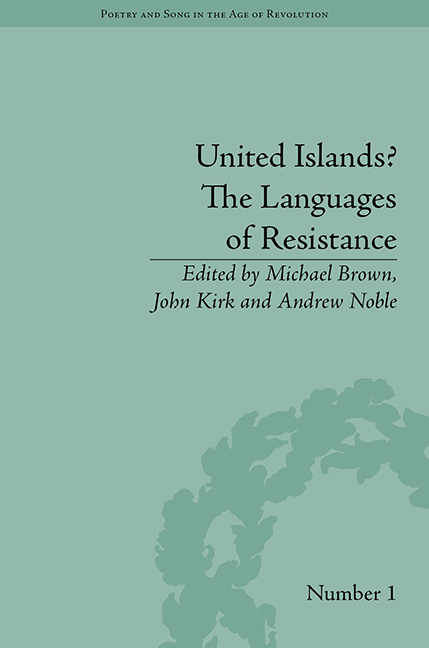Book contents
- Frontmatter
- CONTENTS
- Acknowledgements
- List of Figures and Tables
- List of Contributors
- Introduction: The Languages of Resistance: National Particularities, Universal Aspirations
- 1 Reading the English Political Songs of the 1790s
- 2 Why should the Landlords have the Best Songs? Thomas Spence and the Subversion of Popular Song
- 3 ‘Bard of Liberty’: Iolo Morganwg, Wales and Radical Song
- 4 Canonicity and Radical Evangelicalism: The Case of Thomas Kelly
- 5 Charlotte Brooke's Reliques of Irish Poetry: Eighteenth-Century ‘Irish Song’ and the Politics of Remediation
- 6 Homology, Analogy and the Perception of Irish Radicalism
- 7 Lost Manuscripts and Reactionary Rustling: Was there a Radical Scottish Gaelic Poetry between 1770 and 1820?
- 8 Virile Vernaculars: Radical Sexuality as Social Subversion in Irish Chapbook Verse, 1780–1820
- 9 Thomas Moore and the Problem of Colonial Masculinity in Irish Romanticism
- 10 Radical Politics and Dialect in the British Archipelago
- 11 ‘Theaw Kon Ekspect No Mooar Eawt ov a Pig thin a Grunt’: Searching for the Radical Dialect Voice in Industrial Lancashire and the West Riding, 1798–1819
- Afterword: The Languages of Resistance
- Notes
- Works Cited
- Index
4 - Canonicity and Radical Evangelicalism: The Case of Thomas Kelly
- Frontmatter
- CONTENTS
- Acknowledgements
- List of Figures and Tables
- List of Contributors
- Introduction: The Languages of Resistance: National Particularities, Universal Aspirations
- 1 Reading the English Political Songs of the 1790s
- 2 Why should the Landlords have the Best Songs? Thomas Spence and the Subversion of Popular Song
- 3 ‘Bard of Liberty’: Iolo Morganwg, Wales and Radical Song
- 4 Canonicity and Radical Evangelicalism: The Case of Thomas Kelly
- 5 Charlotte Brooke's Reliques of Irish Poetry: Eighteenth-Century ‘Irish Song’ and the Politics of Remediation
- 6 Homology, Analogy and the Perception of Irish Radicalism
- 7 Lost Manuscripts and Reactionary Rustling: Was there a Radical Scottish Gaelic Poetry between 1770 and 1820?
- 8 Virile Vernaculars: Radical Sexuality as Social Subversion in Irish Chapbook Verse, 1780–1820
- 9 Thomas Moore and the Problem of Colonial Masculinity in Irish Romanticism
- 10 Radical Politics and Dialect in the British Archipelago
- 11 ‘Theaw Kon Ekspect No Mooar Eawt ov a Pig thin a Grunt’: Searching for the Radical Dialect Voice in Industrial Lancashire and the West Riding, 1798–1819
- Afterword: The Languages of Resistance
- Notes
- Works Cited
- Index
Summary
The Early Printed Books collection of the Library of Trinity College Dublin holds copies of some of the many versions and editions of hymnbooks produced by Dublin evangelical clergyman and secessionist Thomas Kelly (1769–1854). Among its holdings is a copy of the sixth edition (1826) of Kelly's Hymns on Various Passages of Scripture which is inscribed ‘For Lady Powerscourt’. Theodosia Wingfield, Lady Powerscourt was the widow of the fifth Viscount Powerscourt, the chatelaine of the great Powerscourt estate in County Wicklow, and a person of definite significance in Irish society. At first glance, such a personage might seem an unlikely recipient for the gift of a small volume of hymns, written by an enthusiastic evangelical who had seceded from the established church, and established a denomination of his own. The fact that the gift was perfectly chosen, and eminently suitable is an indication of the extent of the impact that radical evangelicalism was having on the shape of Irish society. This chapter will outline this impact by examining the contents of this and other volumes, considering the significance of the hymns written and published by Kelly.
That the close of the eighteenth century was a time of unprecedented social upheaval is an historical truism. Revolutions in France and America, armed uprising in Ireland and increased social unrest in England seemed to be the harbingers of a cataclysmic reordering of established society. The world, it appeared, was changing, violently and irrevocably. And this social transformation was echoed in a far-reaching religious transformation. As evangelicalism began to prosper, the assumptions that had underpinned generations of religious life were vigorously questioned.
- Type
- Chapter
- Information
- United Islands?The Languages of Resistance, pp. 77 - 94Publisher: Pickering & ChattoFirst published in: 2014

